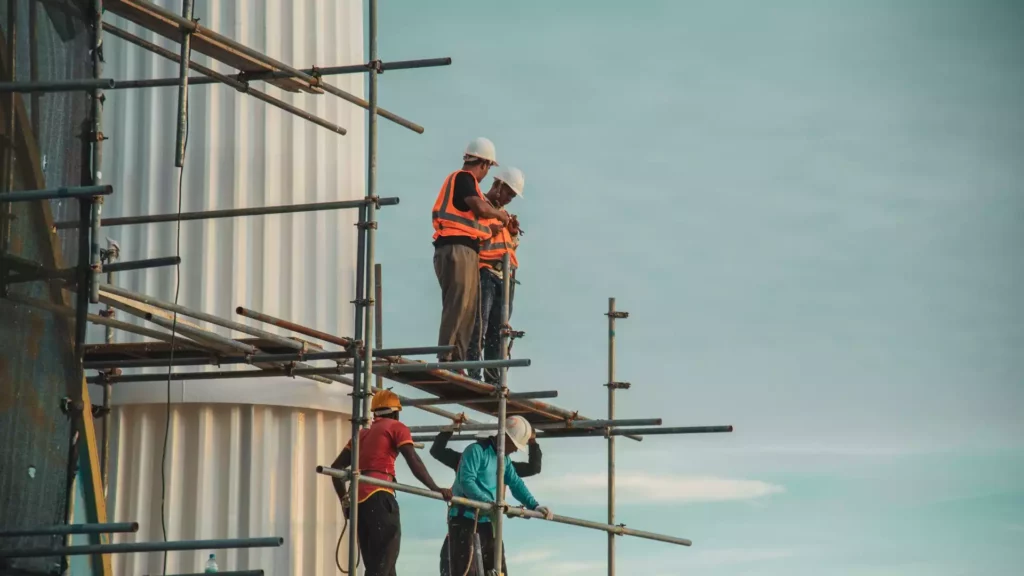The construction and public works sector is characterised by high employee mobility. This means that we have to travel to work sites on a daily basis, which means that we incur professional expenses. How are employees compensated for travel, accommodation and meal expenses ? How can we optimise costs to keep within the site budget and ensure employee satisfaction ?
Vertical Expense unveils the new compensation scales for BTP travel expenses and offers some ideas for effective expense management.
1. Different types of travel expenses in the construction industry
The scale of allowances in the construction industry is based on the distance travelled between the employee’s home and the worksite. This categorisation makes it possible to differentiate the amount of the allowances according to the size of the trip. There are 3 kilometre zones :
- Zone 1 : Up to 50 km
- Zone 2 : Between 50 and 100 km
- Zone 3 : Over 100 km
– Short journeys (Zone 1)
For short-distance journeys, reimbursement allowances are generally lower. They can take the form of :
- Mileage and meal expenses : calculated according to the official scale in force.
- Public transport tickets : on presentation of receipts.
- Flat-rate allowances : in certain specific cases, capped at €15 per day.
| Return journey (km) | Daily exemption limit (€) |
|---|---|
| 5 – 10 km | 3,00 € |
| 10 – 20 km | 6,10 € |
| 20 – 30 km | 9,10 € |
| 30 – 40 km | 12,10 € |
| 40 – 50 km | 15,20 € |
| 50 – 60 km | 18,20 € |
| 60 – 70 km | 21,20 € |
| 70 – 80 km | 24,20 € |
| 80 – 90 km | 27,30 € |
| 90 – 100 km | 30,30 € |
| 100 – 110 km | 33,30 € |
| 110 – 120 km | 36,40 € |
| 120 – 130 km | 39,40 € |
| 130 – 140 km | 42,40 € |
| 140 – 150 km | 45,50 € |
| 150 – 160 km | 48,50 € |
| 160 – 170 km | 51,50 € |
| 170 – 180 km | 54,50 € |
| 180 – 190 km | 57,60 € |
| 190 – 200 km | 60,60 € |
| Amounts | Meals taken away from company premises or on site (2) | Restaurant meals (3) |
|---|---|---|
| Amount at 1ᵉʳ January 2024 | 10,10 € | 20,70 € |
((2) If it is shown that the employee is unable to return to his residence or usual place of work for the meal, and that he cannot take his meal in the restaurant.
(3) If it is shown that the employee is obliged to take his meals in the restaurant.
– Long-distance travel (Zone 2 & 3)
If the worksite is located a long way from home, long-distance travel allowances apply. They generally include :
- Transport costs : payment of plane, train or car hire tickets.
- Accommodation costs : reimbursement of hotel nights or other types of accommodation.
- Daily allowances : compensation for meals and other daily expenses.
| Length of assignment | Meals (€) | Accommodation & breakfast Paris + 92/93/94 (€) | Accommodation & breakfast Other departments (€) |
|---|---|---|---|
| For the first 3 months | 20,70 € | 74,30 € | 55,10 € |
| After 3ᵉ months and up to 24ᵉ months | 17,60 € | 63,20 € | 46,80 € |
| After 24ᵉ months and up to 72ᵉ months | 14,50 € | 52,00 € | 38,60 € |
Amounts at 22 September 2023
Martinique, Guadeloupe, Guyane, La Réunion, Mayotte, Saint-Pierre-et-Miquelon, Saint-Barthélémy, Saint-Martin
| Service | Flat-rate allowance |
|---|---|
| Hosting | 120 €* |
| Meals | 20 € |
*150 for an employee recognised as a disabled worker with reduced mobility.
Nouvelle-Calédonie, Wallis-et-Futuna, Polynésie française
| Service | Flat-rate allowance |
|---|---|
| Hosting | 120 €* |
| Meals | 24 € |
*150 for an employee recognised as a disabled worker with reduced mobility.
Allowance applicable to all lump-sum bases
| Travel time | Allowance |
|---|---|
| More than 3 months | 15 % |
| More than 24 months | 30 % |
2. Specific rules & applicable in the construction industry
2. Specific & applicable rules The BTP collective agreement lays down the rules and scales applicable to travel allowances. Length of journey, distance travelled, type of transport used, accommodation, etc. are all criteria that influence the amount of allowances paid. However, companies are perfectly entitled to offer more advantageous compensation by means of a company agreement or a unilateral decision by the employer.
💡 It is important to note that the rules applicable to travel allowances may vary depending on each employee’s situation.
Here are some examples of specific situations :
- Disabled employees : Disabled employees may be entitled to specific allowances to compensate for the additional costs associated with their travel.
- Temporary employees : The rules applicable to travel allowances for temporary employees may differ from those for permanent employees.
- Expatriate employees : Expatriate employees may be entitled to specific allowances to compensate for the costs associated with their expatriation.
3. Tools to make expense claim management easier
Given the complexity of the rules and the diversity of situations, digital tools offer invaluable solutions for simplifying and optimising the management of expense claims in the construction industry. Whether in the form of dedicated software, mobile applications or collaborative platforms, these tools offer numerous advantages for companies and employees alike.
Let’s take a closer look at the features and benefits of each type of tool :
- Expense claim software : Electronic receipts, automated calculations, expense tracking…expense claim software makes administrative management easier.
- Mobile applications : Real-time entry of expense reports, photos of receipts, transmission of expense claims… mobile applications simplify expense report management at every level.
- Collaborative platforms : Tracking expenses by managers, validation of expense claims by the finance department… collaborative platforms promote communication and transparency.




